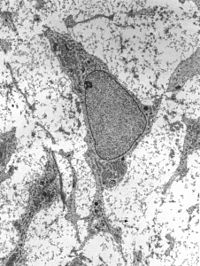Mesenchyme
| Mesenchyme | |
|---|---|

Transmission electron micrograph of mesenchyme displaying the ultrastructure of a typical cell and matrix.
|
|

Mesenchyme (pointer) stained with H&E
|
|
| Details | |
| Carnegie stage | 6b |
| Precursor | primarily mesoderm |
| Identifiers | |
| Latin | mesenchyma |
| Code | TE E5.16.4.0.3.0.18 |
|
Anatomical terminology
[]
|
|
Mesenchyme is a type of tissue characterized by loosely associated cells that lack polarity and are surrounded by a large extracellular matrix.
Mesenchymal cells are able to develop into the tissues of the lymphatic and circulatory systems, as well as connective tissues throughout the body, such as bone and cartilage. A malignant cancer of mesenchymal cells is a type of sarcoma.
Mesenchyme is characterized morphologically by a prominent ground substance matrix containing a loose aggregate of reticular fibrils and unspecialized cells. Mesenchymal cells can migrate easily, in contrast to epithelial cells, which lack mobility and are organized into closely adherent sheets, and are polarized in an apical-basal orientation.
Mesenchymal tissue is a tissue type composed of migratory cells that have undergone an epithelial to mesenchymal transition. Mesenchyme exists as essential migratory tissue in embryonic development, plays several roles in the adult, and can form as a result of cancer cells metastasizing. It lacks a specifically defined morphological structure, but is characterized by a lack of cell surface adherent molecules such as E-cadherin, non-polarity, extending filopodia, and high migratory capacity. The cells are surrounded by large extracellular matrix. Some mesenchyme will also undergo a mesenchyme to epithelial transition, which is the basis for migratory metastasizing cancers such as metastatic squamous cell carcinoma.
...
Wikipedia
